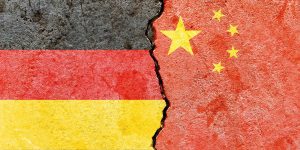On December 2, German Foreign Minister Annalena Baerbock made a two-day visit to hold a strategic dialogue with Chinese Foreign Minister Wang Yi. It was her second visit to the country, following her first trip to China in April 2023. Baerbock’s recent visit also marked the last official visit to China by any Cabinet member of this current “traffic light” (ampel) coalition, which fell apart last month after German Chancellor Olaf Scholz dismissed Finance Minister Christian Lindner and said he would hold a vote of confidence in the German parliament. The vote is expected to lead to general elections early next year instead of previously planned in September 2025. Despite these crucial and turbulent times, Baerbock’s visit to China meant that Germany – and the EU – in general, were determined to maintain their geopolitical and geoeconomic interests.
During her visit, Baerbock held the seventh round of the China-Germany Diplomatic and Security Strategic Dialogue with her Chinese counterpart in Beijing. She is reported to have taken a tough stance on China and accused Beijing of supporting Moscow in its war against Ukraine by providing military aid in the form of drones or drone components. Baerbock said, “Drones from Chinese factories and North Korean troops attacking peace in the center of Europe violate our core European security interests.” She warned that Russian President Vladimir Putin was pulling Asia into the Ukrainian war and said that China’s support for Russia would affect the bilateral ties between the two countries.
However, despite this strong position against Beijing’s support for Moscow, China’s response to Baerbock’s remarks was restained. Beijing’s reaction is likely due to its growing economic woes and may depict its bargain to win European trade and economic markets. Chinese Foreign Ministry Spokesperson Lin Jian in his regular press conference said regarding the Ukraine crisis, “China has made clear its position many times. We firmly oppose groundless accusations, blame-shifting, and political manipulation.” It is imperative to note here that Beijing has not condemned Russia’s war on Ukraine and is considered a significant source of support for Moscow in this war.
Besides security, the issue of electric vehicles (EVs) was also part of Baerbock’s discussion with Wang. In October 2024, the EU imposed new tariffs of up to 35 percent on subsidized EVs from China for five years. The move was vocally criticized by Germany, as it could impact the market for German cars in China. China is a huge market for new German cars, where approximately a third of new German cars are sold annually. Last year, German vehicles worth 15.1 billion euros were delivered to China, which indicates the significance of the Chinese market for Germany’s auto industry.
In a tit-for-tat move, China imposed tariffs on brandy imported from the EU and threatened to increase tariffs on petrol-powered vehicles, which could heavily impact Germany’s car market.
During her discussion with her Chinese counterpart, Baerbock urged Beijing to constructively engage with the EU over the levied tariffs. According to her spokesperson, she said, “A level playing field, fair competition, and reciprocal market conditions are essential.” According to the Chinese Foreign Ministry readout, while responding to the issue of EVs, Wang said that the competition should not be a zero-sum game but rather a fair competition. He argued that “the EU’s imposition of high anti-subsidy tariffs on Chinese electric vehicles violates the principles of fair competition and free trade and has become a prominent issue between China and the EU.” He expressed his hope that Germany and the EU would adopt a pragmatic attitude toward China and resolve the trade dispute through consultation and dialogue.
In order to deal with its dependency on China, last year, Germany issued its first “Strategy on China.” As the strategy highlighted, “China has changed, and so we need to change our approach to China.” By Germany’s standards, this strategy was a bold move. It insinuated that Germany viewed China as capable of interrupting its economic as well as security interests.
The war in Ukraine has made Germany realize that it should not be dependent on any country. Germany wants to deal with the challenges China poses and seeks to strengthen exchange and cooperation with China. At the same time, Germany views China simultaneously as a partner, competitor, and systemic rival, as the strategy highlighted. The strategy also aligned the German government more clearly with the European Commission, which recently has become a more critical voice against China.
“De-risking” was the buzzword of this strategy, rather than “decoupling.” Germany does not want to decouple from China, as they both need each other economically. China, with a trade volume of 253.1 billion euros last year, was Germany’s most significant trading partner for the eighth consecutive year. Thus, Germany does not want to decouple from China but wants to engage on fair and equal ground without jeopardizing its economy and security.
The issues discussed during Baerbock’s visit were the amalgamation of the growing disagreements between the two countries. Despite being a strong strategic economic partner, China is a systematic rival and a competitor of Germany. China is a great power and holds great importance in world politics, and its rise has compelled states to come up with their respective strategies for China. to best promote and protect their national interests. Germany did the same with its China strategy. Now the question is whether the current government’s approach – which is to de-risk from China to secure its economic interests – will carry on past the expected elections.
































